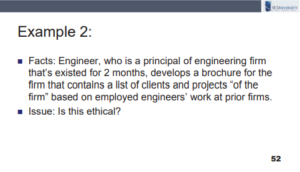The Ethics of Advertising
What kinds of ethical dilemmas could arise from a straightforward brochure offering your engineering services? What legal rules exist to regulate professional advertising? Are you familiar with the ethical guidelines of any professional society to which you are a member?
In the March 2022 SEU session, Matthew Rechtien, PE, Esq., from Walter P Moore, presented our 2022 Engineering Ethics Update: The Ethics of Competition. Matt explained how qualifications-based selection works and its legal and ethical implications. He also reviewed the legal and ethical implication of gifts and reviewed the ethical constraints on advertisement.
Matt explored the legal limits in regard to professional advertising for a variety of states and the general consensus is that advertisements must be truthful and not deceptive or misleading. Some states include more specific language regarding resumes, brochures, or solicitations, however, the general legal requirements for professional advertisements focus on truthfulness. Truthful advertisement is protected “commercial speech” guaranteed by the 1st and 14th Constitutional Amendments, and Matt noted that the Supreme Court has stricken most attempts at regulation of professional advertising.
While the Constitution may govern our legal rights to professional advertising, the First Amendment does not apply to private regulations such as those set forth by voluntary professional societies. Ethical guidelines drafted by agencies such as NSPE and ASCE certainly require a higher benchmark for their membership. For instance, NSPE requires that “Engineers shall not attempt to obtain… professional engagements by … other improper or questionable methods” and ASCE requires engineers to “uphold the honor, integrity, and dignity of the profession…” These requirements certainly create an additional burden of responsibility for engineers to advertise in such a way as to not impugn the profession itself while also meeting the legal obligation of being truthful and not deceptive.
Both NSPE and ASCE publish examples of previous ethical dilemmas considered by their board members. NSPE’s Board of Ethical Review publishes all of their opinions, and you can search by topic for previous rulings. ASCE’s Committee on Professional Conduct also publishes cases that have been considered which can be found monthly in Civil Engineering Magazine or you can search by topic on their website. For example, Matt used a case example that was similar to a case highlighted by NSPE, as shown in the following slide:
Matt noted that NSPE “…was deeply troubled by the manner in which the Engineer undertook to promote his new engineering firm because we believe there was a clear effort on the part of the Engineer to engage in misleading and deceptive acts…” In the ruling by NSPE, the committee notes how the engineer violated its Code of Ethics and ways in which the engineer could have avoided the charge of being misleading in their advertisement.
Both NSPE and ASCE can offer insight on precedents set by these ethics committees when engineers have encountered ethical dilemmas in their advertising. While advertising may not be as heavily regulated as ethical quandaries such as gifts to elected officials or bribery, there are still many instances where improper advertisements for engineering services have resulted in disciplinary actions from these voluntary societies. Be sure to check out these excellent resources of past cases, and avoid any ethical infractions in your resumés, brochures, or website advertising.



There are no comments yet, but you can be the first